Key takeaways:
- Effective mentoring involves fostering a collaborative environment, encouraging critical thinking, and nurturing curiosity in new researchers.
- Emotional support and recognition of progress are crucial for building confidence and a sense of belonging in the surgical community.
- Establishing clear communication channels and setting expectations can enhance the mentoring relationship and prevent misunderstandings.
- Flexibility in mentoring styles is essential to meet the unique needs of mentees and unlock their full potential.
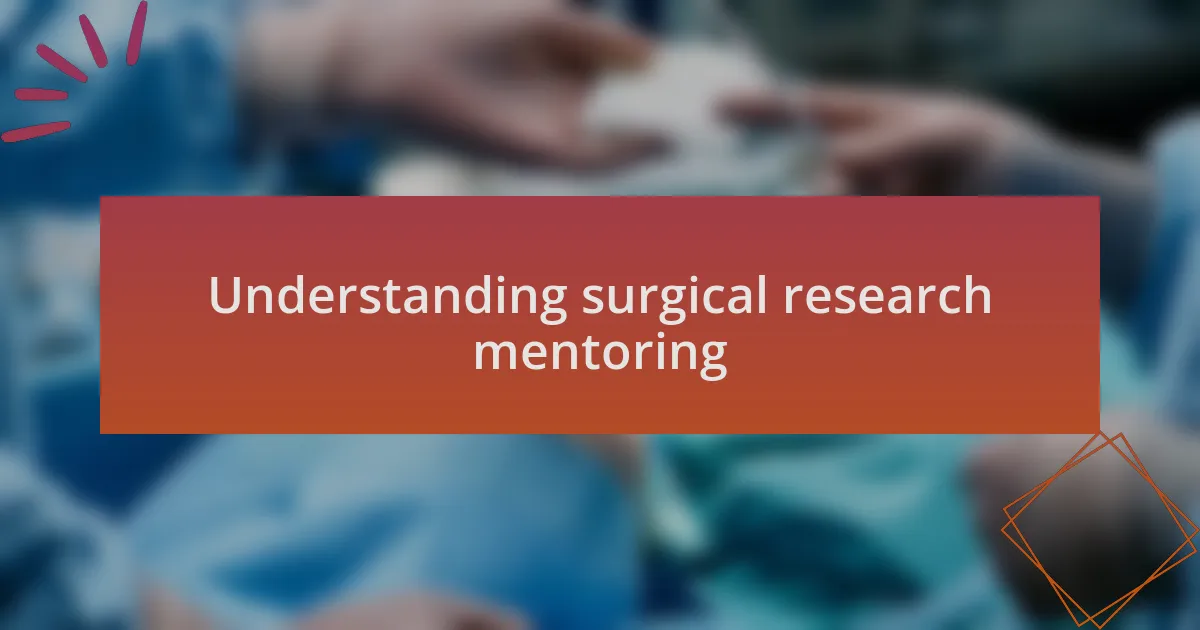
Understanding surgical research mentoring
Mentoring in surgical research is more than just guiding a novice through the basics; it’s about fostering a collaborative environment. I recall my first experience paired with a mentor who not only shared knowledge but also challenged me to think critically about my research. Have you ever had someone in your career inspire you to exceed your own expectations? That’s the essence of effective mentoring.
When I reflect on my mentors, I realize they each had unique styles but shared an underlying commitment to support my growth. They didn’t just provide answers; they asked thought-provoking questions that pushed me to explore deeper. How can we nurture that same curiosity in new researchers today? By encouraging them to ask their own questions and explore various avenues, we cultivate a richer research experience.
Moreover, the emotional connection in mentoring cannot be understated. I remember the moments when my mentor celebrated my small victories, reminding me that every step counts in surgical research. How does recognition of progress influence a new researcher’s journey? It’s the encouragement that not only builds confidence but also a sense of belonging in the surgical community.
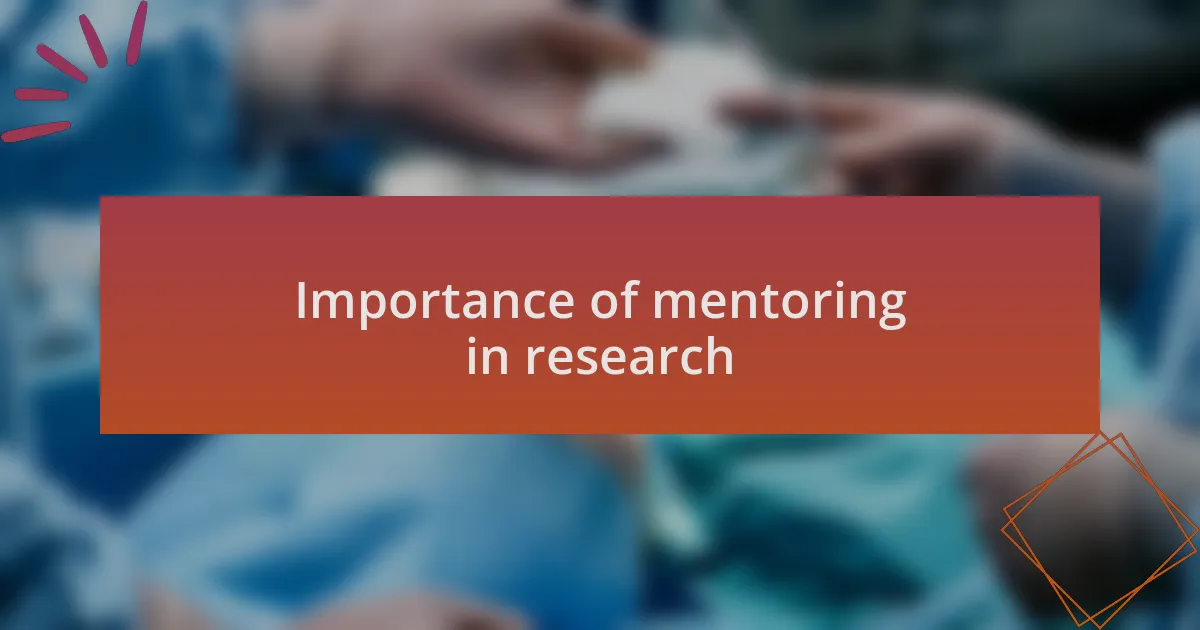
Importance of mentoring in research
The role of mentoring in research is truly pivotal, providing a support system that extends beyond mere technical guidance. I remember one particular instance when my mentor offered to review my grant proposal at the last minute. Their willingness to invest personal time not only improved the proposal but also taught me the importance of collaboration. Isn’t it fascinating how a single act of support can reshape our approach to research?
Additionally, mentorship instills resilience, a crucial trait in the often-challenging landscape of surgical research. There was a time when I faced significant setbacks in a study I was leading, and it was my mentor’s belief in my potential that helped me persevere. How often do we allow doubt to cloud our progress? A good mentor not only reassures but also equips researchers with the skills to navigate obstacles, transforming failures into learning opportunities.
Furthermore, mentoring cultivates a culture of curiosity and innovation in the research community. I’ve seen firsthand how a mentor’s enthusiasm for new ideas can ignite a spark in their mentees. Have you ever been inspired by a fresh perspective that changed how you approached your work? In fostering this environment, mentors help researchers not only to contribute to existing knowledge but also to innovate, which is crucial in advancing surgical research.
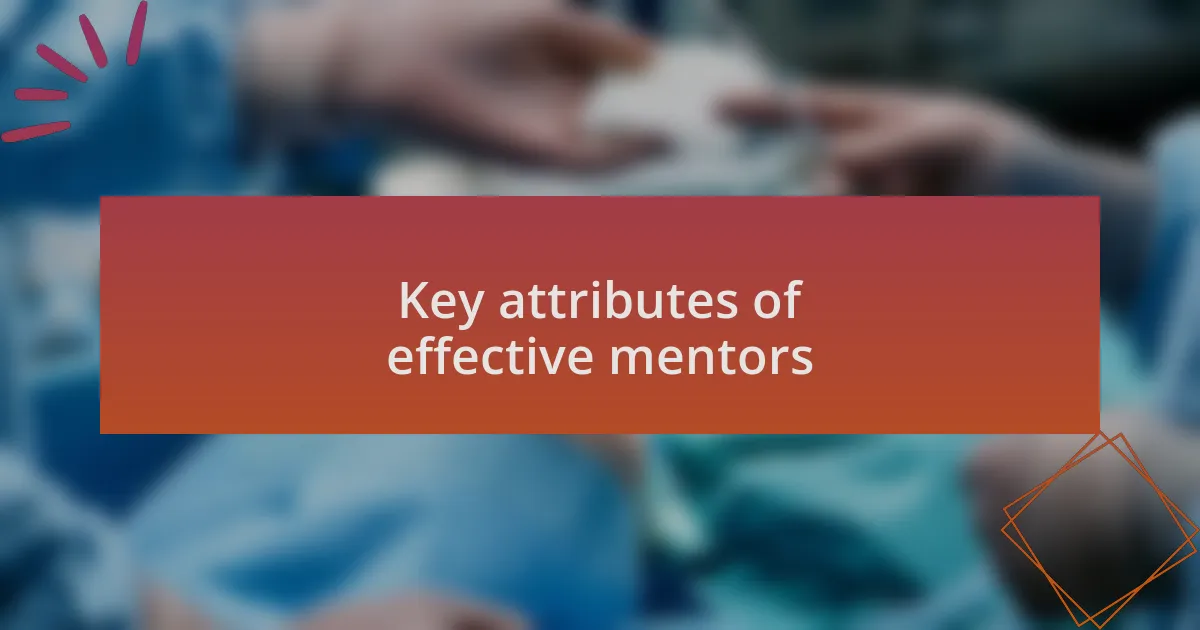
Key attributes of effective mentors
One of the key attributes of effective mentors is their ability to empathize with their mentees. I recall an instance when I felt overwhelmed during a crucial project. My mentor took the time to share his own experiences with similar feelings of inadequacy, showing me that even seasoned researchers face hurdles. Isn’t it reassuring to know that vulnerability can be a part of the journey? This connection fosters trust and encourages mentees to open up about their struggles without fear of judgment.
Another vital quality I admire in mentors is their dedication to fostering independent thinking. I remember a project where my mentor encouraged me to explore my own hypotheses rather than just following established protocols. This guidance not only boosted my confidence but helped me develop critical thinking skills essential in research. Have you ever realized that a little nudge can lead to significant breakthroughs? By empowering mentees to think for themselves, mentors lay the groundwork for innovative contributions in surgical research.
Moreover, effective mentors are lifelong learners themselves. They are not just sharing knowledge, but are also seeking new information and adapting to advancements in the field. I’ve experienced this firsthand during a collaborative seminar led by my mentor, who enthusiastically engaged with new research findings. Seeing this passion for learning reinforced my belief in the importance of staying updated. Isn’t it inspiring when a mentor shows that learning doesn’t stop at any stage of one’s career? This trait not only maintains a dynamic mentor-mentee relationship but also models the essence of continuous improvement essential in our ever-evolving field.
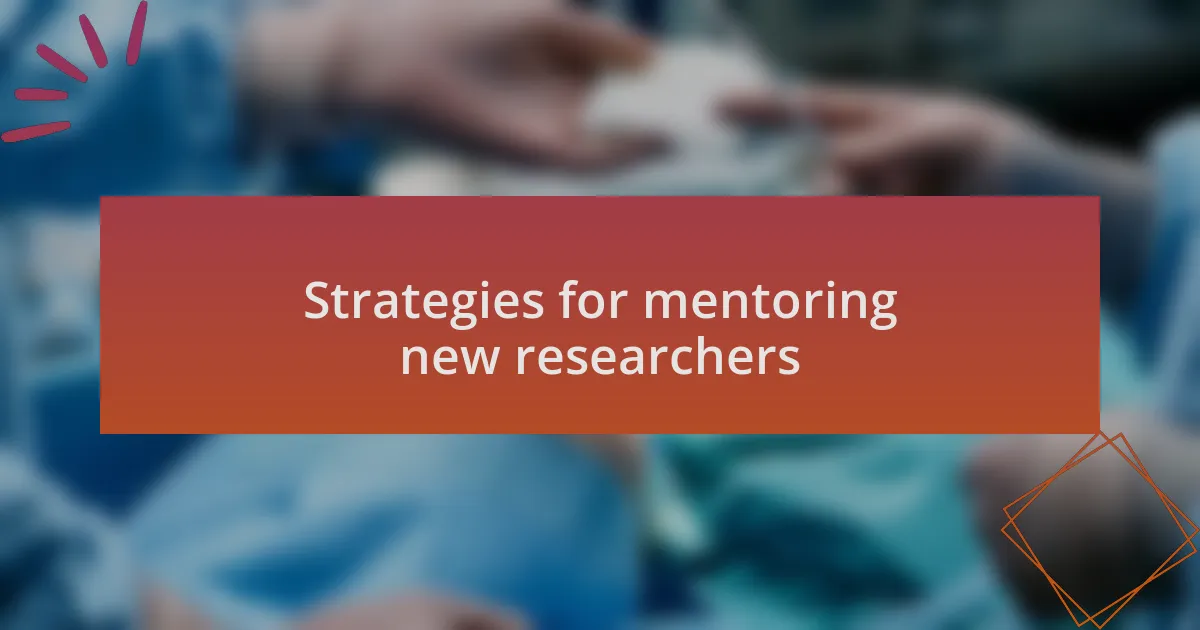
Strategies for mentoring new researchers
One effective strategy for mentoring new researchers is to establish clear communication channels. I vividly remember a time when my mentor set up weekly check-ins, creating a safe space for discussion. This approach helped me express my thoughts freely and clarified any uncertainties I faced. Have you ever struggled to voice your concerns? Regular communication can bridge that gap and transform potential frustrations into constructive dialogue.
Encouraging mentorship beyond just professional guidance can also be a game-changer. I once initiated a casual coffee meeting with a group of mentees, where we discussed not only research topics but also personal challenges related to work-life balance. This informal setting opened up conversations that deepened our connections. How often do we miss out on the human aspect of mentorship? It’s crucial to recognize that a mentor’s role extends beyond academia; it encompasses personal support as well.
Lastly, sharing constructive feedback is a crucial strategy that mentors should adopt. Early in my research career, I received thoughtful critiques that highlighted my strengths and areas for improvement. Rather than feeling discouraged, I learned to see feedback as a roadmap for growth. Isn’t it fascinating how the right words at the right time can propel someone forward? By delivering feedback in a supportive manner, mentors can motivate new researchers to continuously strive for excellence in their work.
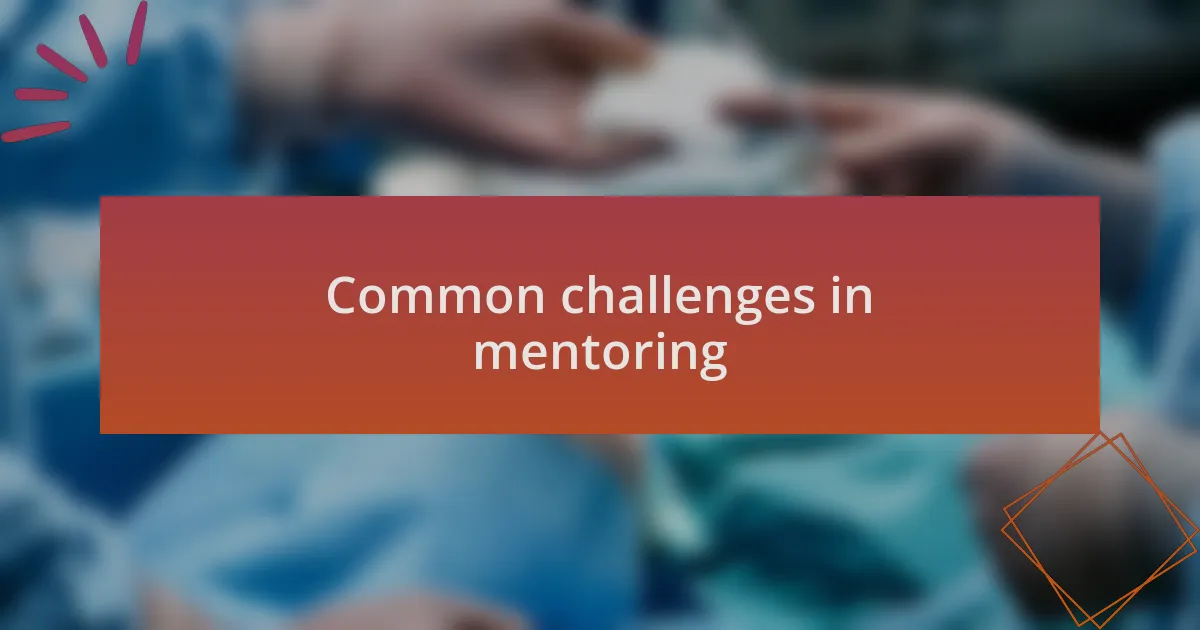
Common challenges in mentoring
Mentoring new researchers often comes with its own set of unique challenges. One common issue I’ve encountered is the disparity in expectations between mentors and mentees. Early in my own journey, I assumed my mentor knew exactly what I needed, only to find myself feeling lost and unsupported. Have you ever felt the pressure of unspoken expectations? It’s vital for both parties to communicate openly about their goals and to align their visions for the mentoring relationship.
Another challenge is navigating the mentor’s own busy schedule while remaining available for the mentee. I recall a time when my mentor was overwhelmed with commitments, and our conversations became less frequent. This not only left me feeling isolated but also hindered my growth during a critical phase of my research. How can mentors balance their workload while being present for their mentees? It takes intentional planning and prioritization to ensure that researchers feel valued and supported throughout their development.
Lastly, emotional support can often fall by the wayside in a strictly academic mentoring relationship. I once experienced a significant setback in my research, feeling as though my efforts were in vain. My mentor’s empathy and understanding during that time reminded me just how important emotional support is. Why do many mentors overlook this aspect? Emotional resilience is as important as technical skills in research, and fostering a supportive environment can significantly impact a mentee’s confidence and determination to persevere.
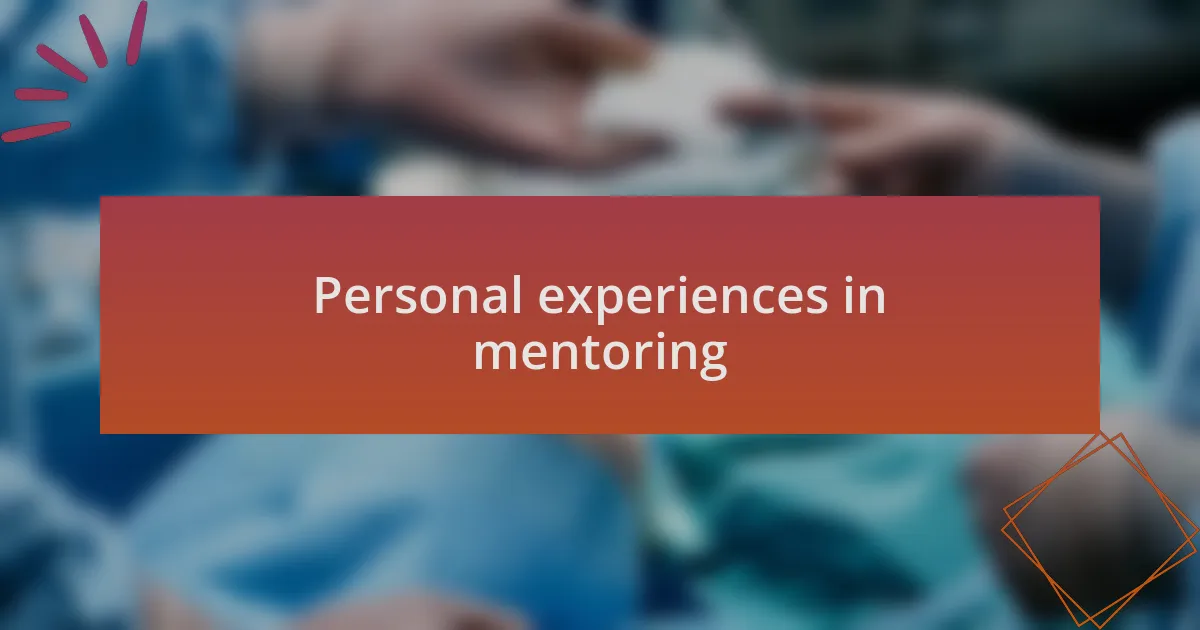
Personal experiences in mentoring
The experience of mentoring new researchers is often incredibly rewarding, but it is not without its poignant moments. I remember one particular mentee who struggled with self-doubt despite showing immense potential. We had a pivotal conversation where I shared my own vulnerabilities when I first began my research journey, and I could feel a shift in their confidence. Have you ever realized how sharing personal challenges can foster a deeper connection? It’s moments like these that remind me how vital it is to create a safe space for mentees to express their fears.
Navigating different working styles can also be a challenge. I had a mentee who thrived in structure, while my approach was more flexible and spontaneous. This discrepancy led to some initial frustrations on both sides. It became a learning experience for us both, pushing me to adapt my mentoring style. How often do we assume our methods are the best without considering the unique needs of our mentees? This situation taught me that flexibility can be the key to unlocking a mentee’s full potential.
I often reflect on the long-term relationships that develop through mentoring. There was a time when I mentored someone who was not just a brilliant researcher but also a great friend. Years later, seeing them now as a successful lead in our field fills me with pride. I wonder, isn’t it incredible how these bonds often extend beyond the academic sphere? Mentoring can nurture not just professional skills, but also lasting connections that enrich both mentor and mentee’s lives.
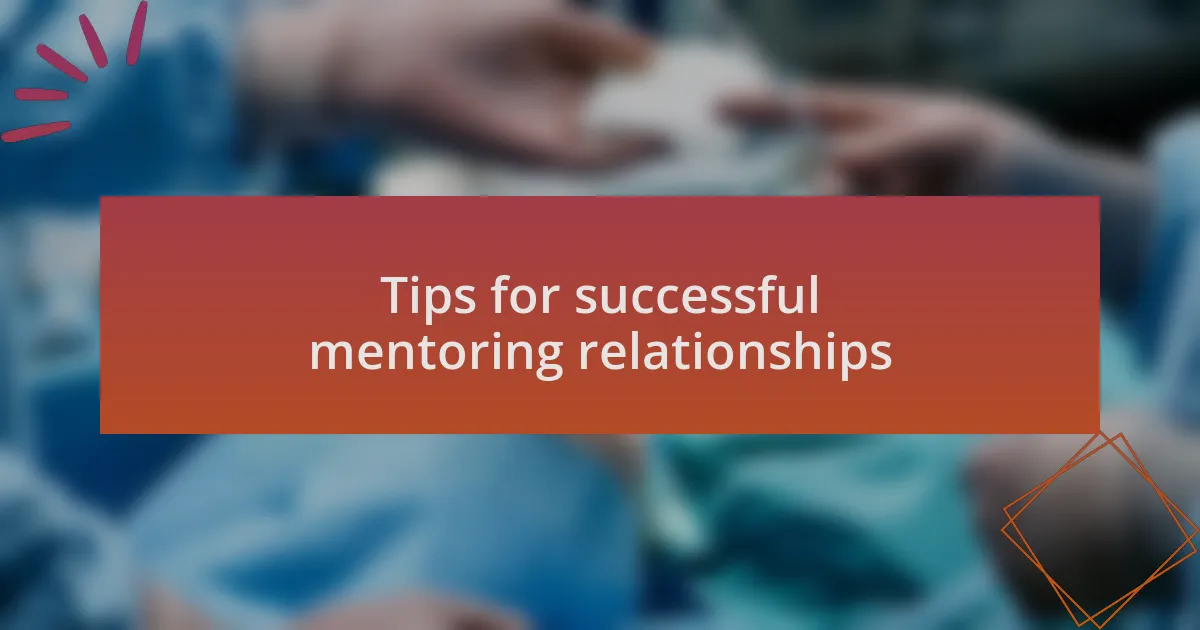
Tips for successful mentoring relationships
Establishing clear expectations early on can significantly enhance the mentoring relationship. I once had a mentee who came in with a laundry list of goals, yet we hadn’t taken the time to discuss what success looked like for both of us. This led to some misalignment and frustration. Have you ever found yourself on different pages with someone? I learned that by defining our roles, responsibilities, and goals upfront, we could create a more focused and effective partnership.
Communication is another cornerstone of successful mentoring. I remember a time when I was too busy to check in regularly with a mentee, thinking they were self-sufficient. However, they needed guidance and felt abandoned. I realized that regular touchpoints could help maintain momentum and foster a deeper level of trust. Isn’t it interesting how a simple text or call can bridge gaps and solidify relationships?
Being open to giving and receiving feedback is crucial for growth on both sides. I recall soliciting feedback from a mentee after a research presentation. Their insights challenged my perspective and ultimately improved my approach. I often ponder, how can we truly grow if we aren’t willing to embrace constructive criticism? This two-way street of feedback encourages continuous learning and strengthens the bond between mentor and mentee, making the entire journey more enriching.